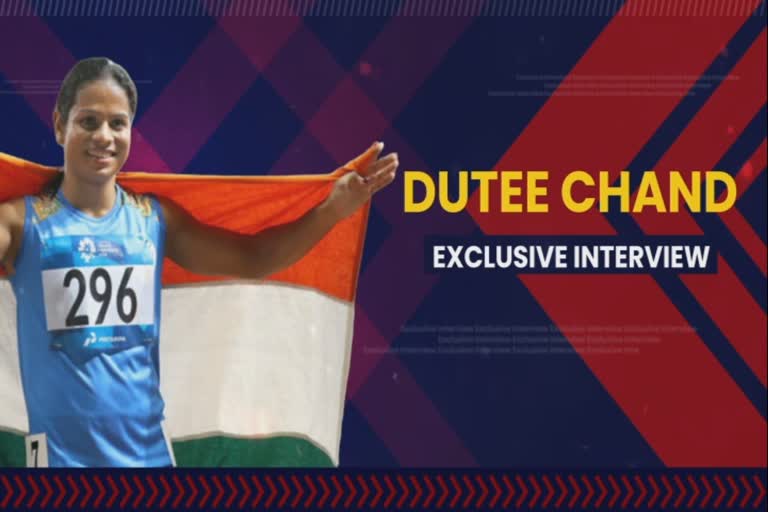Hyderabad: Ace sprinter Dutee Chand, who is the first Indian athlete to come out of the closet, revealed that she was blackmailed and tortured by her eldest sister, which ultimately pushed the sprinter to speak up about her same-sex relationship.
Although Chand drew plaudits for stepping up, the backlash from her family was consistent.
In an exclusive interview with ETV Bharat, India’s LGBT trailblazer Dutee Chand opened up about her struggles with her game, sexuality, and much more.
Dutee, who bagged two silver medals in 2018 Asian Games, openly accepted her sexuality last year when she revealed that she is in a same-sex relationship with a girl from her hometown Chaka Gopalpur in Orissa.
Also Read: Part one of the interview.
Here are the excerpts of the interview.
How has been your lockdown period?
It is going well. Before the COVID-19 pandemic, I was always travelling from one state to another to participate in different events, due to which I never had time to be with my family. But lockdown, due to which all the sporting events across the globe has either been suspended or postponed, has been a blessing in disguise for me as I am now able to spend time with them.
Do you think the postponement of the Tokyo Games will give you more time to prepare?
My training depends upon the upcoming event and I started my preparation for the Tokyo Games in October 2019. And I should have qualified for the Summer Games by April or May 2020. But now that the Tokyo Olympics has been postponed by a year, I will have to start all over again.
Tell us about the hurdles you have to overcome while you were beginning your career?
In the very beginning, I suffered a lot. There are so many families that do not allow girls to pursue their dreams. but I would like to thank my family for giving me this opportunity.
Also, when I started running, I use to run in my village without any shoes, there was no ground there and I did not have any coach. The people in my village also used to criticise me for aiming to be an athlete, but I continued with my running practice.
You started running to bag a government job. But, when did you realise that you want to become a professional athlete?
My sister got a government job because of sports quota, so she motivated me to become a sprinter when I was a child, so that I can also get a government job like her.
For around three-four years I played at the national level and also got a government job at the age of 18. But as I grow-up, people started recognising my efforts and also appreciated it, so I decided to continue the hard work, which helped me in becoming an international athlete.
I won my first international medal in 2013 and I haven’t looked back since then. I bagged two medals in the Asian Games. I am the first Indian athlete to win a gold medal in the University Games.
What was your mindset after you were banned by IAAF in 2015 on grounds of hyperandrogenism?
I am a born fighter. I have always fought for everything that I have achieved. I fought poverty and the mindset of the people in my village to become a sprinter. Talking about the ban by IAAF, then it happened after I was selected for Asian and Commonwealth Games in 2014. But during the last few days of training camp, I was removed from the Indian team and was told that I cannot participate in the tournaments.
Nobody told me the reason behind my snubbing. I was just told that there is some kind of blood problem in my body due to which I was asked to go home and come back only when I am fine and my health condition is normal.
After hearing that I was so confused and devastated. But later a scientist told me about the rules and regulations of IAAF. She told me about the hyperandrogenism test and failing in this test results in getting banned for life.
After I got to know about this test, I realised that the high hormone level in my body was natural and not because of intake of any medicine. So, I decided to file a complaint against the ban and two years later I won the case.
After the ban was lifted, I came back, started my training and I qualified for Rio Olympics. I was the first Indies sprinter to do that in 36 years.
